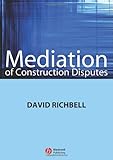| Title: | Mediation of Construction Disputes |
| Categories: | Construction |
| Authors: | David Richbell |
| ISBN-10(13): | 1405169311 |
| Publisher: | Wiley-Blackwell |
| Publication date: | 2008-02-29 |
| Number of pages: | 192 |
| Language: | English |
| Picture: |

|
| Review: |
This book is written by someone who loves the construction industry and who is saddened by the time and cost wastage expended in managing disputes as opposed to spending that time and cost in wealth generation. The author believes in mediation. This book is aimed at users of mediation, whether they be parties, advisors or experts with the underlying reason to encourage confidence in the mediation process. The process, it is argued, has consequential benefits to dispute resolvers. Prospective readers should look elsewhere for training in the core skills and techniques of mediation but should come back to this book as a follow up. The book takes us through three sections divided across 11 Chapters, each Chapter with a very helpful 'in a nutshell' table at the end of each chapter summarising what the chapter has covered. The first three chapters begin by setting out how disputes can grow whether from legal, commercial, cultural or personality differences to how they can be resolved (by various means) before presenting a very solid case for mediation. The second section takes the reader through preparing, presenting, negotiating and concluding the mediation. The second section also indicates, in a very clear way, the role each party to the process plays. Before coming to some useful appendices, the final section takes the reader briefly back a step to highlight how disputes can be avoided. The book is then brought to a close by mapping out the mediation landscape and then, perhaps most importantly, setting out that if the process is used effectively how everyone can win. The book serves as a good readable introduction to mediation by someone who has the industry in his blood. David Richbell's love for the industry shows clearly throughout, and if this reviewer dare use an analogy, much like a father wanting his young children to stop arguing and make the most of their time together. It is to be hoped his message about the benefits of mediation succeeds. In any event, this book is a good read for those people who wish to resolve their disputes amicably and a must read for those who still prefer to fight it out to the bitter end. Wayne Lord Loughborough University w.e.lord@lboro.ac.uk |



